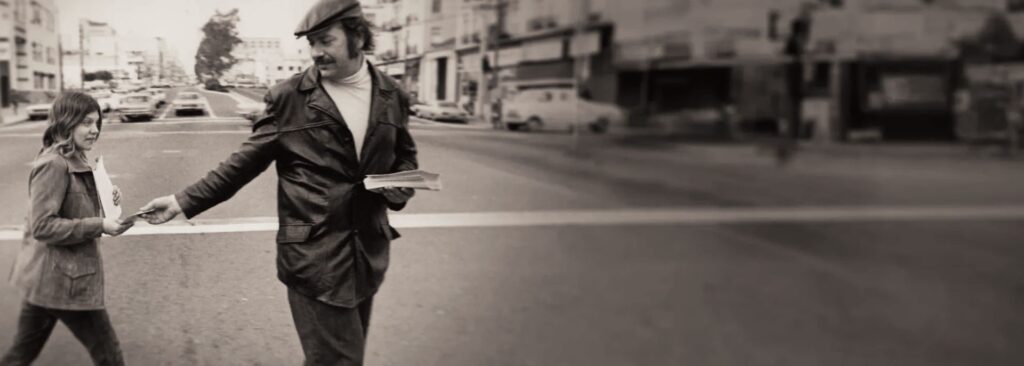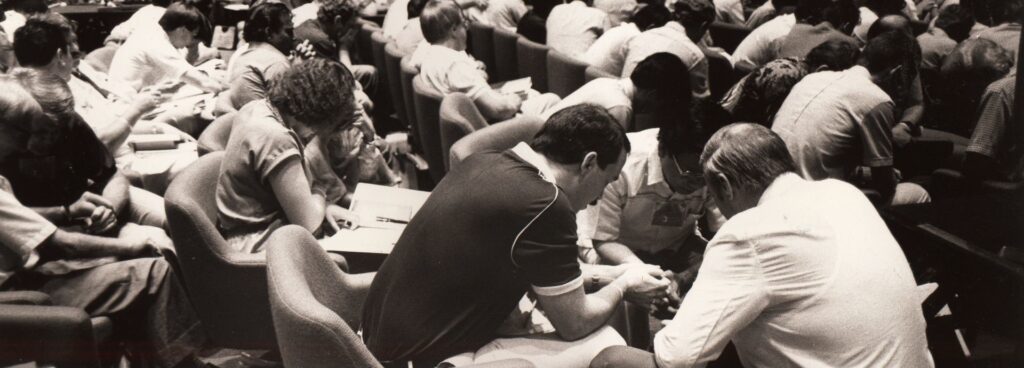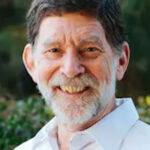I found my journal from July 1974. I can’t believe the memories from attending the first Lausanne Congress on World Evangelization in Switzerland. I was 27 and I had known life in Jesus for less than four of those years. I’m Jewish, so faith in Christ rocked my existence to the core. It also began the journey that might connect us in South Korea this year.
My journal note on Sunday, 16 July 1974, was ‘What am I doing here?’ I wondered what I, a Jew, was doing at an international conference for Christians who wanted to spread the gospel. I grew up in the social fabric of American Jewish culture and the practice of Judaism. My worldview once was, ‘Jews don’t believe in Jesus. We just don’t!’
The short version of that transformation starts in 1970. The social, political and counter-cultural challenges of life at the time had me asking God two hard questions: ‘Who are you?’ and ‘How do you think I’m doing?’ The God of Abraham startled me with his answers to my simple prayer, ‘How am I doing?’ It became painfully clear that I’m broken! Ugh, I wanted to blame God. ‘Okay, I’m broken, but you made me. So, what did you ever do to fix me?’

Until then, I had never been curious about the New Testament. I was questioning, so when no one was looking, I read the gospel of John. Starting out, it sounded like Genesis 1. Then, I read where Jesus said, ‘I am the way, the truth and the life. No one comes to the Father but through me’ (John 14:6). That was the answer to my question, ‘Who are you?’ As I put my faith in Messiah Jesus, the Savior cleansed me of the guilt and shame of my sin. I told Him, ‘Here am I,’ but I was hoping he wouldn’t expect me to tell anybody. You can go ahead and laugh.
Within weeks, I left my job, asked a pastor to baptize me, and took a one-way flight to London. I went on to Israel! Everything was new. In Jerusalem, I found a spiritual community among Jewish and Arab Christians and a Jewish brother who helped me on the walk of faith as a Messianic Jewish disciple of Jesus. I didn’t know about the larger movement of Jews who were coming to faith in Jesus.
Meanwhile, something dramatic had changed in me. I felt a growing desire to tell my people that the Messiah is Yeshua (Jesus). I also knew that I had to return to the United States after two years abroad. My destiny was back in California where I connected with the original band of ‘Jews for Jesus’. Most came from traditional Jewish families and lived the countercultural activism typical in the late 1960s.

We championed the gospel in public and with a Jewish chutzpah (audacity). We composed klezmer style Jewish gospel music, wrote and distributed provocative pamphlets with titles like, ‘Jesus Made Me Kosher’. We aimed to change the Jewish community climate of opinion about Jewishness and Jesus. In September 1973, Moishe Rosen, the instigator and founder of Jews for Jesus, incorporated us as a mission to reach Jewish people with the gospel. Four months later, I was hired on staff as the first ‘field missionary’ at the age of 26. I had been a Messianic Jew (a Jewish Christian) for barely three years.
Around that time, missiologists were taking note of our indigenous manner of gospel advocacy. Moishe received an invitation to the Congress on World Evangelization to be held in Lausanne, Switzerland. With an apology, Moishe declined since he was overwhelmed with the brand-new mission start-up. So, he sent me on his invitation to Lausanne. I had no idea what the Congress on World Evangelization was about. I’d only been told, ‘Go, and learn everything you can.’
Fifty years later, I’m looking back at my journal with gratitude for the experience and what it taught me. Knowing what I know now, I’m pleased to share some observations that would have helped me get the most from that experience in 1974. My take-aways focus on connections, discoveries and opportunities.

Connections
Behold, how good and pleasant it is when brothers dwell in unity. (Ps 133:1 ESV)
The Lord delights when his body of committed followers work together to accomplish His will. The Lausanne Movement’s purpose, from the First Congress to the Fourth, is ‘to connect influencers and ideas for global mission’. Doing that fulfills a current and historic crucial need.
The vision for the Lausanne Movement came from a look back to the early 20th century. It was a time of rapid global mission expansion. In June 1910 the World Missionary Conference was convened in Edinburgh, Scotland. It brought together 1,215 representatives to give presentations from eight reporting commissions regarding the state of global missions at that time. Lord Balfour, of the Church of Scotland, was the president with John R. Mott, a Methodist leader of the Student Volunteer Movement, serving as chair. In years that followed, Mott played a significant role in bringing together indigenous voices from the flourishing international evangelistic community. After the First World War, he was a driving force in establishing the International Missionary Council(IMC). The IMC continued to bring mission voices together focused on ‘the evangelization of the world in this generation’. After the Second World War, the World Council of Churches was formed and swallowed up the IMC. By then, the two world wars and a global economic depression had sapped the earlier vitality for international missions.
The Lausanne Movement began with a friendship between evangelist Billy Graham and churchman scholar John Stott. In the 1974 Congress, they hoped to once again reenergize, mobilize and focus the cause of global evangelism. They rightly believed that the evangelistic movement of the church could be revitalized by bringing together missiologists, theologians, church-growth practitioners and skilled communicators of the gospel to cooperate, collaborate and stimulate one another for the cause of Jesus. Lausanne still brings key people together to stimulate fresh ideas for global mission. That’s what we will do later this year at the Fourth Lausanne Congress in Incheon, South Korea.
[Billy Graham and John Stott] rightly believed that the evangelistic movement of the church could be revitalized by bringing together missiologists, theologians, church-growth practitioners and skilled communicators of the gospel to cooperate, collaborate and stimulate one another for the cause of Jesus.
I learned the value of connections in a profound way. For 20 years I was president of the Lausanne Consultation on Jewish Evangelism (LCJE). In 1980, the Lausanne Committee sponsored a cluster of mini consultations in Thailand for mission practitioners to unreached people groups. One task force was on Christian Witness to the Jewish People. Thirteen Jewish mission participants and five consultants, including Moishe Rosen, sketched out the plan for a network of affiliated Jewish evangelism specialists.
Forty-four years later, the Lausanne Consultation on Jewish Evangelism (LCJE) connects 29 global Jewish mission agencies across 8 regional affiliated networks. They meet regularly for reports, prayer, strategy and collaborative evangelism efforts in Australasia, North America, Korea, Japan, Latin America, Europe, Israel and South Africa. Today, LCJE is the longest serving network among the 28 Lausanne issue networks.

Discoveries
In 1974, Congress participants sang, ‘Let the Earth Hear His Voice’. I have to admit, I struggled as a Jewish outsider who viewed myself as invited into a dominant western Christian worldview. I had grown up believing God’s message in Isaiah 49:6, that my people were chosen to be a light to the nations. That is still true. Yet over my lifetime I have realized that we are all, myself included, ethnocentric. However, in Jesus we are made one in the household of God, yet out of many peoples. We come from various geographical locations, diverse cultures, and are called to serve the Lord through our unique ministries.
I’m naturally an introvert, so conferences require me to come out of my shell. I’ve learned to wait for God-surprises from spending time with individuals, learning their story and what God is doing. Those discoveries are the best part of connections with his people.
One evening at the ’74 Congress, friends invited me to a Christian and Missionary Alliance sponsored dinner. Given a plate of appealing ethnic cuisine, I found a table where I asked two strangers if I could join. As I took my seat, four of their friends followed to the table. Then they began speaking Arabic to one another.
There are certainly new connections, people and ideas to discover just ahead during your time at Lausanne 4. Some might have a life changing impact for your ministry and the lifetime of mission service ahead of you.
From 1971 – 1972, I lived in Israel where I had so many good opportunities to meet with Arabs who were Christians, Muslims and secular. During a three-month trip, I travelled across Asia from Turkey through Iran, Afghanistan, Pakistan and into India. The story is too long to tell here. It’s just to say that by 1974 I could be comfortable with six potentially new friends speaking Arabic. After all, at the Congress we all were washed in the Savior’s blood.
When someone at the table asked my name, I knew they would recognize that I’m Jewish. That prompted animated conversation in Arabic between them. One explained that they were from Syria, Lebanon, Jordan and Egypt. None of them had previously met a Jewish person, let alone one who shared faith in Jesus. A bond of fellowship immediately transcended our cultural and national differences. That night we discovered the ‘greater works’ that Messiah Jesus promised His followers, each laboring within our different evangelistic fields and passions.
In 1989, Jewish community leaders, cooperating with mainline Christians, sought to counter Jewish evangelism efforts. They promoted the idea of two-covenant theology, by agreeing in a hypothesis that Christians had their way of salvation in Jesus and Jewish people had their own through Moses and the beliefs of Judaism.
I discovered we had friendships from Lausanne connections with other significant voices, who stepped in to help our cause. A consultation convened, to bring 15 international theologians, church men and women, and missiological scholars together. The Willowbank Declaration on the Christian Gospel and the Jewish People came out of that meeting, affirming God’s unique way of salvation for all people, including the Jewish people (Acts 4:12).
The joys of discovery, collaboration and inspiration are some of the unanticipated benefits I’ve experienced out of the Lausanne network. There are certainly new connections, people and ideas to discover just ahead during your time at Lausanne 4. Some might have a life changing impact for your ministry and the lifetime of mission service ahead of you.

Opportunities
At the First Lausanne Congress, I was amazed by reports of where spiritual breakthroughs were taking place. I was excited to see something very cool was happening in the Jewish community. However, it seemed to me like Christians, when thinking about Jewish people, were interested in eschatology more than in the crucial task of communicating the gospel. And then I encountered the Global Diaspora Network.
Pastor Sadiri Joy Tira, along with my mentor and missiology scholar, Enoch Wan, launched the Global Diaspora Network (GDN) at a 2004 Lausanne gathering in Pattaya, Thailand. Diaspora was a 2,500-year experience of Jewish life until 1948. The GDN thought about diaspora in terms of theological significance. God scattered ancient Israel to prove his righteousness and faithful character to his covenants. He scattered the disciples to reach the ends of the earth with the gospel. The GDN opened my eyes to diaspora populations in changing global circumstances that are open to new opportunities for evangelistic engagement.
Jewish-Gentile Couple Ministry
Ministry connections and discoveries, many within the Lausanne Movement, have contributed to shaping my life and ministry. I’m seeing that especially now, at the capstone of my career, in work specialized among Jewish-Gentile couples.
The 1990 National Jewish Population Survey reported that 52% of all American Jews were intermarrying. That was a shock to the Jewish community at the time. In 2020, Pew Research reported that 47% of all American Jews are now intermarried. Those Jewish people are in a Diaspora moment. And they are frequently receptive to spiritual discovery of the gospel.
The Lausanne community has shown me the value of intercultural studies, missiological strategy and innovations for thoughtful gospel engagements. Our Jewish Evangelism consultations have provided opportunities to participate in workshops, test ideas, present papers, train and mobilize others for the task of evangelism. I could not have imagined any of those outcomes back in 1974.
I hope these vignettes encourage excitement as you anticipate your time at the Fourth Lausanne Congress. While there, make memories then anticipate lessons the Lord will draw from them. Blessings, and may your years ahead be filled with fruitful ministry.
Endnotes
- Tuvya Zaretsky, Hineni: Here Am I, God, but Where are You? (San Francisco, CA: Jews for Jesus, 2004).

